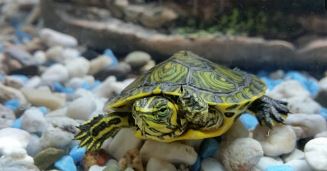|
|
|
|
wsp_rte_replace_marker?

|
Habitat - Turtles need clean water deep enough to swim in and an area to climb totally out of the water. Usually, 50 gallons per turtle is suitable.
This area should have a basking light so they can dry out their shell. Turtles need a UVA/UVB full spectrum light for calcium absorption. Replace the light every 6 months for optimal absorption. Most species do well at 80F to 85F but check with your veterinarian for individual species requirements. Diet - A turtle's diet should consist of:
Aquatic turtles readily eat small gravel and become blocked. It is best to use either nothing on the tank bottom, or large river rocks. Lightly sprinkle a calcium supplement on the adult diet two to three times weekly.
Other - Water becomes contaminated quickly unless changed frequently. Generally, weekly water changes are recommended. Commercial water filters are available but do not completely eliminate the need for water changes. Contaminated water can cause shell and skin infections. Improper diet causes swollen eyes and respiratory problems. Turtles often have internal parasites.
Reptiles are often asymptomatic carriers of Salmonella. Thoroughly wash your hands after contact with your turtle or your turtle’s enclosure, and never clean turtle caging in the kitchen or bathtub. As a general rule of thumb, turtles should not be owned by young children, especially individuals likely Remember to always wash your hands after handling any animal, especially reptiles and amphibians. See information from the CDC about reptiles and contagious salmonella infections.
|




